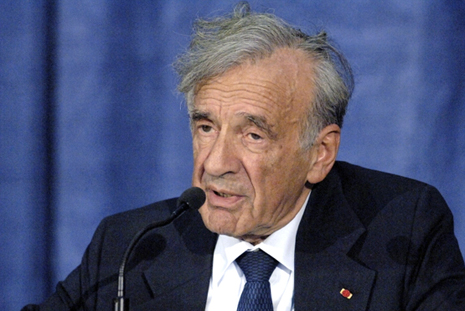FAYETTEVILLE, Ark. – Elie Wiesel, whose memoir Night has brought the horror of the Holocaust home to generations of students around the world, will speak at 7 p.m. Wednesday, March 7, at the Walton Arts Center as part of the University of Arkansas student-funded Distinguished Lecture Series. A 30-minute book signing will follow the lecture. The event is free and open to the public. Free tickets will be available at the door and seating is limited.
Wiesel was 15 years old in 1944 when he and his family were sent from their home in what was then Hungary to the Nazi Auschwitz concentration camp. His mother and younger sister were killed there. Wiesel and his father worked as slave laborers at Auschwitz and later Buchenwald, where his father was killed a few months before the camps were liberated by U.S. troops.
Wiesel was sent to an orphanage in France, where he learned French. He attended the Sorbonne and later became a journalist.
Wiesel remained silent about his experiences in the concentration camps for 10 years, until he was persuaded to write about them. The end result was his first book written in Yiddish, published in 1956, which ultimately became La Nuit, published in 1958. It was translated and published in the United States as Night in 1960. It sold poorly at first, but has since become an international best seller. It is required reading in many U.S. high school and college classes, where it has left a strong impression on students.
“One of the main reasons we wanted to bring Prof. Wiesel to the University of Arkansas is that we know his book has impacted a wide breadth of students,” said Kayln Williams, student chair of the Distinguished Lecture Series committee. “For the first time, our committee surveyed over 1,000 students and found widespread interest and support for bringing Elie Wiesel to campus. This lecture will serve as an incredible opportunity for students, faculty, staff and the community to hear firsthand the wisdom and courage of a Holocaust survivor and Nobel laureate.”
The Distinguished Lecture Series at the University of Arkansas is a student-sponsored program. Speakers are chosen by a committee made up of students, faculty and staff, and the events are funded by a student-approved fee, appropriated by the Associated Student Government.
Wiesel has dedicated his life to preserving the memory of the Holocaust for future generations and has been a strong advocate for human rights around the world. He was among the first to speak out against the oppression of Jews in the Soviet Union, Nicaragua’s Miskito Indians, Argentina's “Disappeared,” Cambodia’s refugees, the Kurds, South African apartheid victims, famine victims in Africa, the prisoners in the former Yugoslavia and most recently the victims of genocide in Darfur.
Wiesel received the Nobel Peace Prize in 1986. Shortly afterwards he established the Elie Wiesel Foundation for Humanity. He was a driving force in the creation of the U.S. Holocaust Memorial Museum in Washington, D.C., and was awarded the Congressional Gold Medal and the Presidential Medal of Freedom for his work.
Wiesel has written more than 50 books and has taught at Boston University, Yale University and City University of New York.
Contacts
Kayln Williams, co-chair
Distinguished Lecture Series committee
405-996-6808,
Steve Voorhies, manager of media relations
University Relations
479-575-3583,
